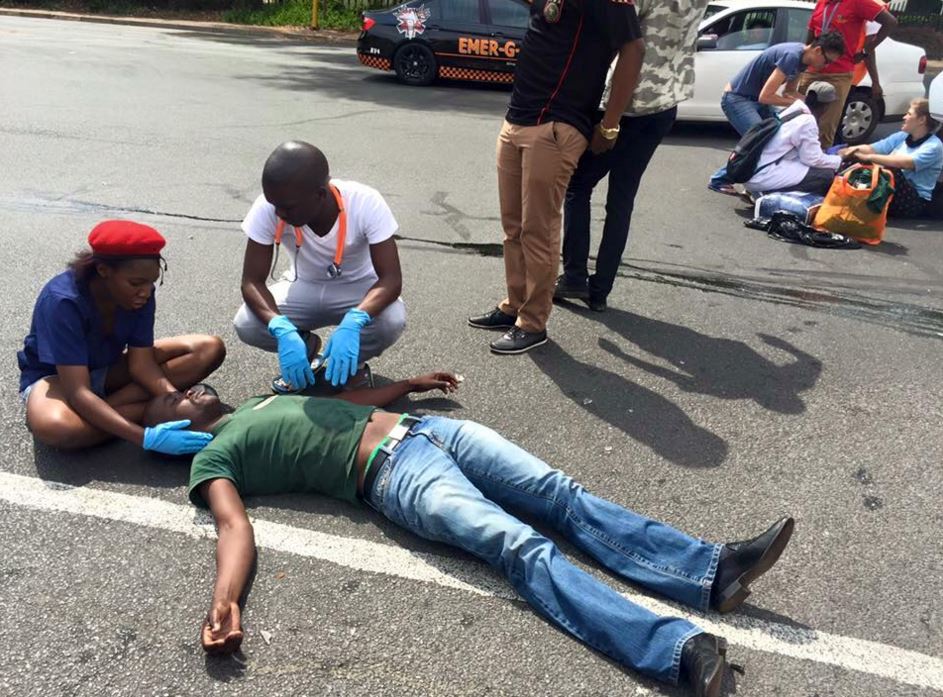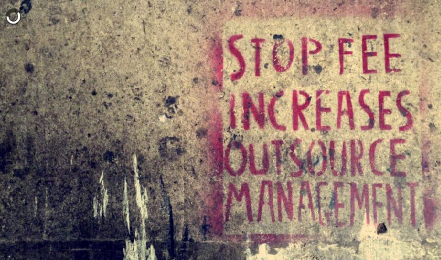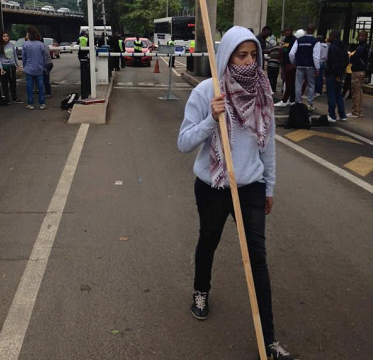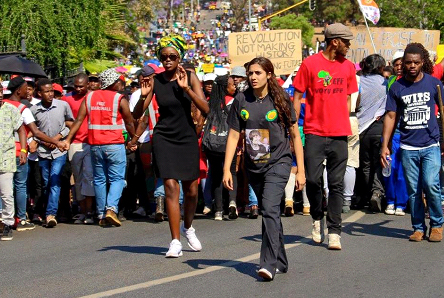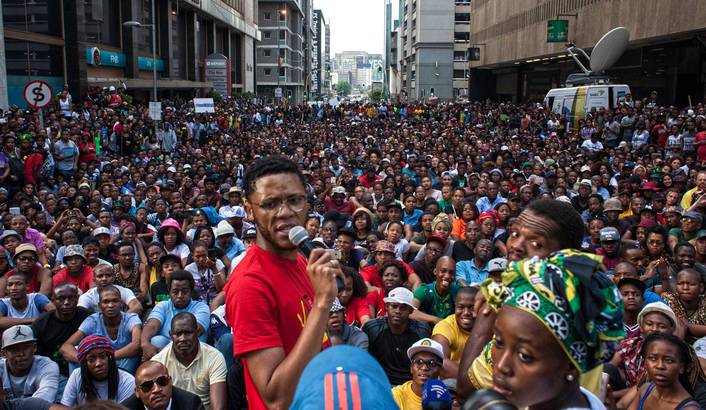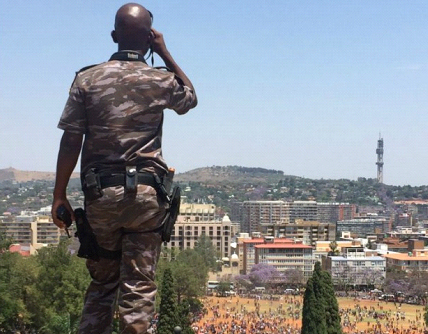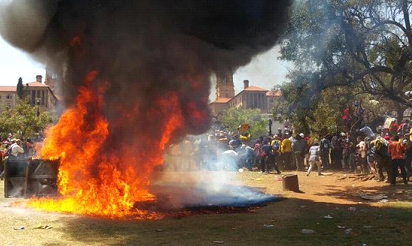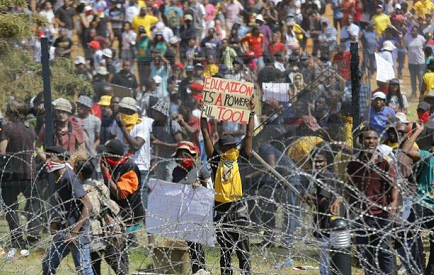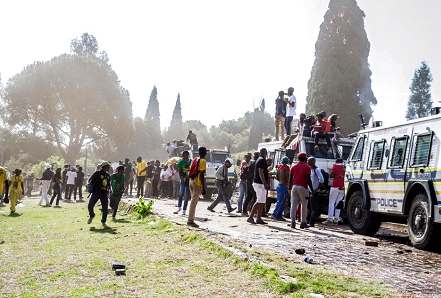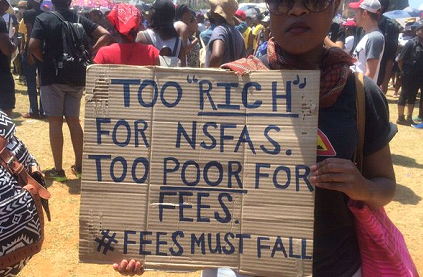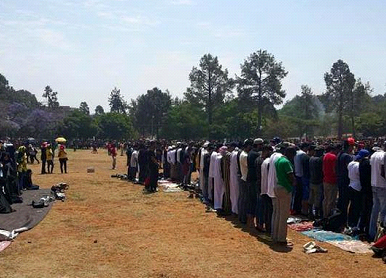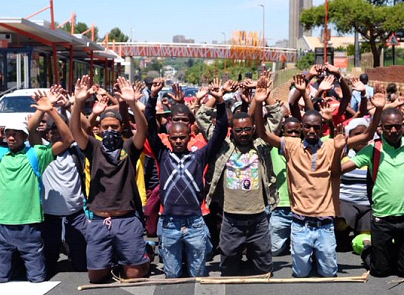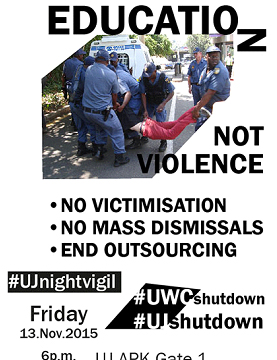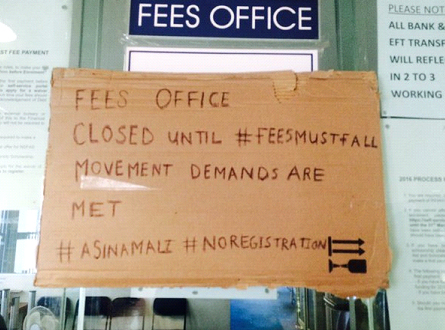The student movement Rhodes Must Fall (#RhodesMustFall, #RMF) garnered much media attention in March of 2015, after Chumani Maxwele of the movement defiled a Rhodes statue on the Upper Campus of the University of Cape Town (UCT) with faeces.
Instead of succumbing to public pressure and media scrutiny, the movement became further radicalised and escalated their calls for decolonisation of the institution, starting with removal of the Rhodes statue. The ideological struggle of removing the statue became explosive and triggered national debate on social media under the banner #RhodesMustFall.
Exactly one month after the cataclysmic event, on 9 April 2015, the Rhodes statue was taken down by the University. This event marked a symbolic shift in the discourse of South Africa, to one more decolonial in character. RMF, other student bodies, and workers continued to protest against outsourcing and other oppressive structures throughout the year. Social media was used to coordinate events and convey important messages internally and to the general public. RMF also made a documentary on the exploitative nature of outsourcing at UCT. These protest mediums were used in conjunction with occupation and disruption methods on campus.
In February 2015 at the University of Witwatersrand (Wits), the SRC and other students launched the 1Million 1Month campaign to raise funds for students on NSFAS who are still unable to afford registration fees. This brought to the fore the dire financial circumstance of the majority of students at the University. Shaeera Kalla, then standing SRC president and key leader in the WitsFeesMustFall movement, describes in an interview with SAHO that this experience helped prime her for later events, as the issues called for immediate structural change.
In 2001 Wits outsourced all support services at the University and retrenched over 600 employees in the process. This led to the formation of the Wits Workers Solidarity Committee, a committee which various students have been involved in, aimed at campaigning for better treatment of workers by University management and outsourcing companies.
The unfair dismissal of MJL Electrical workers in 2015, after months of not being paid, took place in a highly politicised environment. On 27 May 2015, some workers and students banned together and filled the Vice Chancellor’s office to demand accountability by University management, who had not been responding to emails and other queries.
There was a scheduled workers protest- October 6 Movement, in which a charter was handed over to University management by workers. The protest was attended by many students, and formed the prelude to the protests later that month. It also helped solidify the relationship between students and workers, a relationship that has been instrumental throughout the FeesMustFall movement.
Kalla explains that the SRC had been disputing the 10.5% increase for almost 4 months before the WitsFeesMustFall protests kicked-off on 14 October 2015. Once all diplomatic options were exhausted, “the SRC took a deliberate decision to systematically shut down the university on October 14, the first day of the protest under WitsFeesMustFall banner.” This symbolically illustrated the exclusionary nature of the University and forced the institution to listen to the voices of its students.
According to Kalla, WitsFeesMustFall movement started as a PYA-led SRC initiative and evolved into a student-led non-partisan movement, where decisions were made by a collective student body.
The movement spread into households nationally, and became an international ideology that many students gravitated towards. Oxford now has a Rhodes Must Fall movement (#OxfordRhodesMustFall) that is also working to decolonise the institution, and during height of the national Fees Must Fall movement, students from countries such as the UK, Canada, Australia, and China showed support and protested in their own countries. This speaks to the collective student consciousness that recognises the paradoxical nature of higher education, as a tool of oppression, as well as a means to social upliftment.
Student protests continue in 2016, with registrations and orientations being disrupted at various institutions, and the tenants of the various student movements, such as free education and an end to outsourcing, being developed through various means including protest. Student fees protests have also spread to Namibia where various student organisations are protesting against registration fees and high fee increments.
It is important to note that historically Black universities like the University of Fort Hare and Tshwane University of Technology (TUT), have been protesting in post-apartheid South Africa for many years before the 2015 Fallism Movements came about. The protests from these institutions barely garner any media attention, and mostly result n little to no negotiation with management. Whereas historically White universities like Wits, UCT and the University of Johannesburg (UJ), attract media attention and have proven their ability to bring management into negotiation through protest. Even amidst historically White universities, the media and public attention is disproportionate. For example, between Wits, where the main focus lies, and UJ, which is more of a periphery concern.
The Wits timeline and interview with Kalla are starting points for an extensive documentation of the current history being made by student and worker protests and organisations.
27 May
Workers and students occupy the Vice Chancellors (V.C.) office to protest against the lack of response and responsibility by Witwatersrand (Wits) University in the unfair dismissal of MJL Electrical workers.
“The Wits Student Representative Council notes with great despondency the unjust treatment of the formerly MJL workers at the University who have lost their jobs following months of unacceptable working conditions allowed by the University management” -Wits SRC statement [101] issued on 28-05-2015,
According to the statement:
“On the 27th of May 2015, a number of workers peacefully occupied the Vice-Chancellor’s office after the Office of the Vice-Chancellor had failed to respond to all emails previously sent by the workers to meet before their access cards were shut off on Monday 1 June. It was during the course of this office sit-in wherein the Vice-Chancellor Professor Adam Habib out rightly refused to engage with workers because students who were there in solidarity were present and the workers wanted them to be in the meeting. “
28 May
Wits SRC statement is released stating a position on outsourcing in the University, “Outsourcing is the source of gross exploitation in many instances but even if the university is saying that it cannot end outsourcing due to budget restraints, there is an obligation to outsource responsibly, and to ensure that companies that have university contracts are following the law.” – Wits SRC statement [101] issued on 28-05-2015,
2 October
Wits Council meeting is held in which Shaeera Kalla attends her last Council meeting as standing Wits SRC President. Nompendulo Mkatshwa accompanies her as incoming President and has observer status. The Chair opted for Council members to vote to deal with the disagreement in fee increases. Apart from an academic, Professor David Dickinson, and the only other student representative present- a member for the Post Graduate Association, everyone else voted for the increase.
Kalla identifies [105] this as a turning point towards protest being the only viable option left to deal with unfair exclusionary fee increases.
Wits SRC releases a statement [102] in solidarity with upcoming October 6 Movement. A protest against unfair treatment of workers by outsourcing companies and University management.
“As the Wits SRC we stand in full support of the October 6 Movement and call on University management to stop the exploitation of workers by insourcing labour and ensuring ethical business practise.” –Wits SRC statement [102] issued on 02-10-2016
105: Link for Shaeera interview to go up on SAHO
6 October
October 6 Movement staged by workers and students at Wits and UJ to protest unfair treatment of workers.
Charter [103] presented to management at Wits and UJ by the Wits Workers Solidarity Committee and other organisations.
Thursday 8 October
Wits SRC releases statement [1] saying that the university has taken “a deliberate and anti-progressive decision to once more entrench the financial exclusion of poor students..”
Wednesday 14 October
As per deliberate decision executed by Wits SRC to systematically shutdown the university, students at Wits begin blockading entrances at Wits in response to 10.5% fee hike for 2016.
Lectures and other activities on Wits campus are suspended, and Wits shut-down begins.
Hashtag #WitsWillFall and #WitsFeesMustfall start trending on Twitter and going viral.
Chief Financial officer at Wits, Linda Jarvis, releases a statement [2] explaining increase.
Wits administration applies for court interdict to appeal for police assistance with protests.
Protesting students rename the Senate House/Hall- Solomon Mahlangu House/Hall.
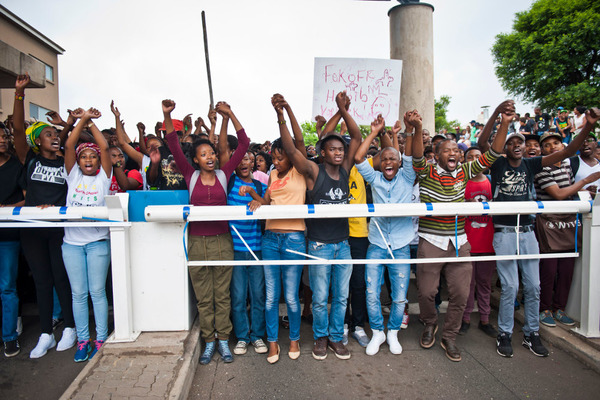 Protesters barricade entrances and disrupt academic activities at Wits. Image source
Protesters barricade entrances and disrupt academic activities at Wits. Image source
Thursday 15 October
Student body protest and Wits-shutdown continues.
The Fifteenth South Gauteng High Court grants Wits an interim interdict for police to interfere on campus, if requested to assist with regulating student protests.
Friday 16 October
Students have a mass meeting with Adam Habib, the V.C. at the Solomon House in Wits.
According to the Vuvuzela [4.1], after the sit-down with the V.C. private security forced their way into the Senate Hall where protestors were barricaded in.
Sit-in protest continued through the night.
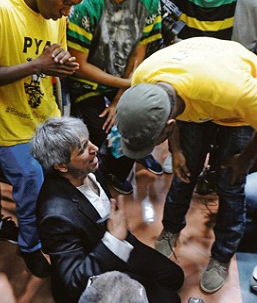 Adam Habib has a sit-in with FMF protesters. Image source
Adam Habib has a sit-in with FMF protesters. Image source
Saturday 17 October
According to statement [5] by Wits spokesperson Shirona Patel: Dr Randall Carollissen, the chairperson at Wits Council, and Shaeera Kalla, outgoing SRC President, met at 6am on Saturday, and an agreement was signed which results in the following:
The fee increase for 2016 was suspended.
It was agreed that disciplinary action would not be taken against participating students or staff members.
A council meeting was planned for Sunday, 18 October, to address student issues.
Wits released a statement [6] that the university will be closed on Monday 19 October, “to allow council to report to University Assembly” by noon, following full-day council meeting on 18 October.
Students continue holding rallies under the FeesMustFall banner.
Mass media outlets are reporting on the movement and the hashtag #FeesMustFall goes viral on social media.
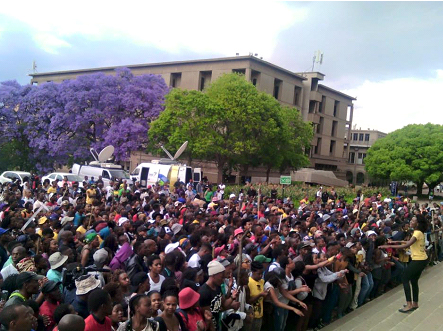 The presence of media at Wits FMF protests helped to garner public attention and force the institution to take student financial issues more seriously.
The presence of media at Wits FMF protests helped to garner public attention and force the institution to take student financial issues more seriously.
Sunday 18 October
Wits University Council full day meeting.
Monday 19 October
Council statement [7] is released electronically and not at university assembly as previously agreed. Student behaviour is held responsible by the university for this change in agreement.
University said to resume on the following day, 20 October.
#National Shutdown starts trending on Twitter and goes viral
UCT shutdown begins led by the #RhodesMustFall movement.
Incident of driver driving vehicle into a group of protesting students and workers blocking the road, the car was subsequently flipped and the driver acquired a minor head injuy.
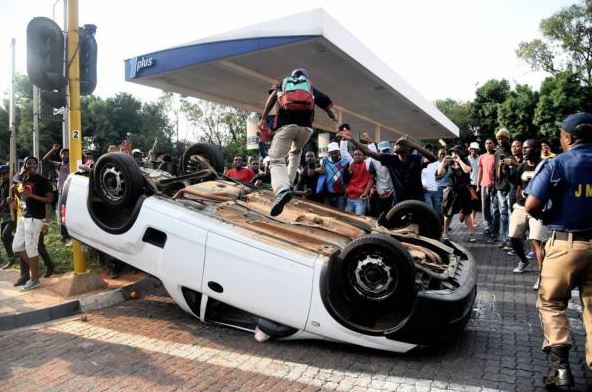 Drivers vehicle is over-turned and driver sustains minor head injury after driving into group of protesting students. Image source
Drivers vehicle is over-turned and driver sustains minor head injury after driving into group of protesting students. Image source
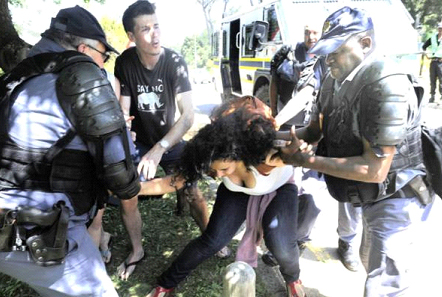 Wits campus becomes a high conflict zone between protesters and policing forces. Credit: David Harrison Image source
Wits campus becomes a high conflict zone between protesters and policing forces. Credit: David Harrison Image source
Tuesday 20 October
Student body protests continue and Wits lectures and activities remain shut-down.
Minister of Higher education, Blade Nzimande meets with university vice-chancellors at Western Cape Parliament.
Nzimande announces that 2016 fee increases will be capped at an inflation-linked 6% and a task team will be established to investigate the issue of fee increases, and report back in six months to advise on future hikes.
Protestors reject this resolution and protesting for #FeesMustFall and #EndOutsourcing continue to increase nationwide.
Wednesday 21 October
A group of student protestors storm parliament in the western Cape as a group of government officials, including Nzimande meet inside. All officials evacuate the premises.
Nationwide protestors continue to reject 6% cap on fees for 2016. Amognst other demands, protestors demand a 0% increase in fees for 2016 and insourcing for workers.
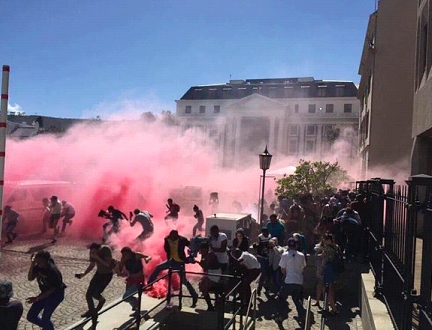 Police firing teargas at protesting students on Parliament grounds. Image Credit: @LionelAdendorf on Twitter Image source
Police firing teargas at protesting students on Parliament grounds. Image Credit: @LionelAdendorf on Twitter Image source
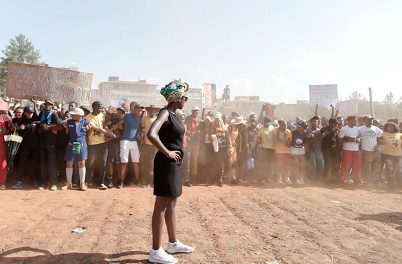 The Wits FMF movement marches to Union Buildings. Image source
The Wits FMF movement marches to Union Buildings. Image source
Thursday 22 October
Protestors march to Luthuli house in Johannesburg and hand over a memorandum [8] to Gwede Mantashe, that demands a no fee increase for 2016, free quality education and no outsourcing of staff at universities
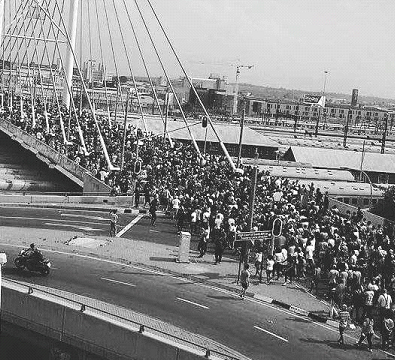 Protestors march to Luthuli house and hand over a memorandum to Gwede Mantashe, that demands a no fee increase for 2016, free quality education and no outsourcing of staff at universities. Image source
Protestors march to Luthuli house and hand over a memorandum to Gwede Mantashe, that demands a no fee increase for 2016, free quality education and no outsourcing of staff at universities. Image source
Friday 23 October
President Jacob Zuma was scheduled to address public on student issues at Union Buildings in Pretoria, after a meeting with Vice Chancellors and student representatives.
Wits SRC were amongst those who chose not to be present in the meeting.
By noon a minority group of protestors set mobile toilets on fire.
Following this the crowd were dispersed with rubber bullets (rubber-coated projectiles) and teargas by police on the ground.
The crowd re-groups several times, each time being disrupted by a minority group in the crowd antagonising police, and the police retaliate with teargas and flash-bangs.
By 1pm two helicopters are hovering over the crowd, dropping teargas bombs to disperse it.
The President does not come out to address the public.
Before 3pm a 0% increase of fees is announced [42] for tertiary institutions nationwide live on broadcast stations instead.
A small group of protestors remain and protest in the street outside Union Buildings.
By 4pm military hippos are driving up and down clearing the streets of remaining protestors. However a number of protestors continue to re-group and barricade the street.
Protests get intensified into the night, not necessarily consisting the same people protesting outside Union Buildings earlier.
Two police vehicles are set on fire.
Reporting suggests that students were not necessarily implicated in the violence that took place outside Union Buildings.
In London hundreds of South Africans gathered at the SA High Commission in support of #FeesMustFall
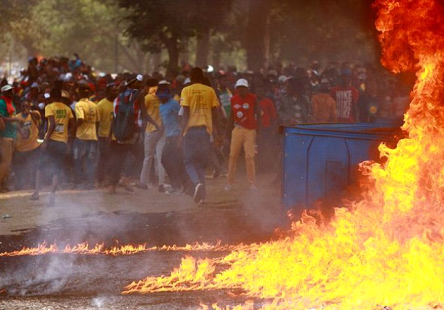 A group of unidentified protestors set the portable toilets on fire. The police then disperse the crowd at the Union Buildings with teargas and rubber-coated projectiles (rubber bullets). Image source
A group of unidentified protestors set the portable toilets on fire. The police then disperse the crowd at the Union Buildings with teargas and rubber-coated projectiles (rubber bullets). Image source
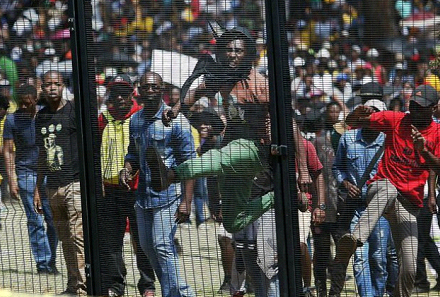 Groups of protestors force their way beyond the barricades to the Union Buildings. Image source
Groups of protestors force their way beyond the barricades to the Union Buildings. Image source
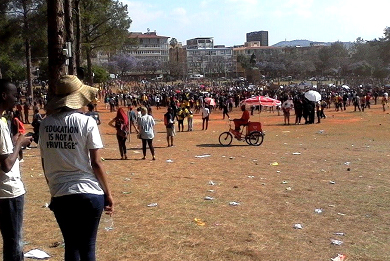 After being dispersed, protesters re-group to hear Presidential address. Credit: Kyla McNulty
After being dispersed, protesters re-group to hear Presidential address. Credit: Kyla McNulty
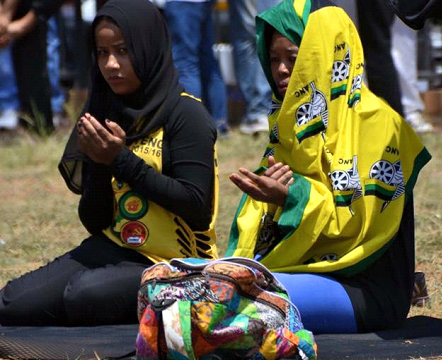 Islam protesters pray amidst the conflict at Union Buildings. Image source
Islam protesters pray amidst the conflict at Union Buildings. Image source
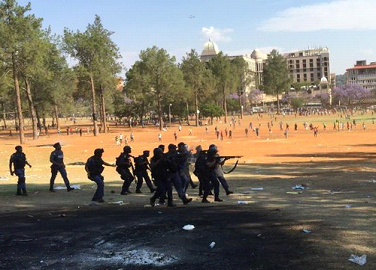 Police in riot gear clear the Union Buildings of last remaining protestors. Image source
Police in riot gear clear the Union Buildings of last remaining protestors. Image source
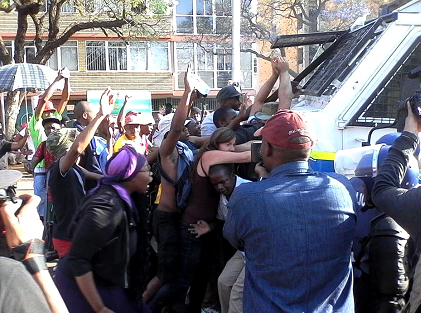 Protesters barricade the street outside Union Buildings. Credit: Kyla McNulty
Protesters barricade the street outside Union Buildings. Credit: Kyla McNulty
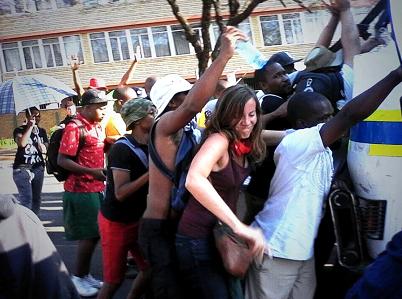
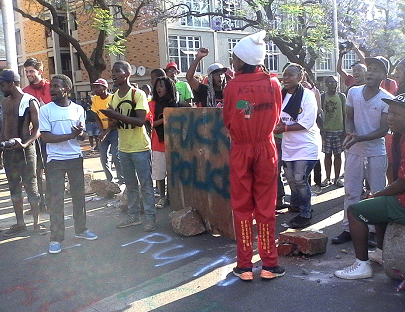
Saturday 24 October
Wits expresses [41] disappointment in the decision of students to continue protesting after 0% fee increment.
Sunday 25 October
Members of the national PYA structures, including President Zuma’s daughter, Thuthu Zuma, former SRC leaders at Wits and current SRC leaders at Wits meet in what becomes a controversial meeting.
The meeting is disrupted by student body members of WitsFeesMustFall. They allege that the meeting is held in secret, and is an attempt by the ANC to capture the movement.
Further allegations are made that the SRC has been bribed.
#ANCcapture begins trending on Twitter (a reference to the meeting)
SRC release a statement [10] pointing out their full right to be associated with the PYA and to meet freely as an organisation. They clarify no decisions were made in the meeting, and that decisions for FeesMustFall are made exclusively as a collective student body.
They claim the rumour of the SRC being bribed as false, and emphasise their full loyalty to the movement.
Wits SRC released a statement [10] that academic activities will continue from Wednesday the 28 October. The statement listed the 0% increase for 2016 as a short-term victory in a long-term battle for free education.
Tensions between the SRC and members of the student body within the WitsFeesMustFall movement begin to solidify.
Monday 26 October
Wits proposes Nine Point Plan [11] to deal with student concerns (in hopes that the university turns normal by Tuesday)
Solomon House Meeting attended by student-body protestors.
Wednesday 28 October
A small group of students and workers, including out-going SRC president Shaeera Kalla, do not go back to class and continue to protest for free education and to end outsourcing.
Thursday 29 October
Wits #FeesMustFall list of 18 demands
Sunday 1 November
Wits releases a statement [13] committing to ‘insourcing in principle’.
Nompendulo Mkatshwa officially takes office as President of Wits SRC, along with Thabo Boom as Deputy Secretary General.
Monday 2 November
Occupation by protesting students begins at UJ
#OccupyUJ begins trending on Twitter
Wednesday 4 November
Wits #FeesMustFall join in #OccupyUJ
Thursday 5 November
Wits #FeesMustFall have their first labour law session. An open discussion about labour concerns in preparation for the shift to insourcing. The session is chaired by representatives from National Minimum Wage Research (NMW) and South African and Casual Workers Advice Office.
Wits #FeesMustFall remain in support of the #OccupyUJ movement by standing tpgether in protest and assisting with food and refreshment supplies.
Friday 6 November
UJ occupation ends after 163 students and workers are arrested, 7 of which are Wits students, including former SRC president Shaeera Kalla.
First group of arrested students and workers are released, including Shaeera Kalla.
#Brixton163 and #Brixton141 start trending on Twitter and go viral.
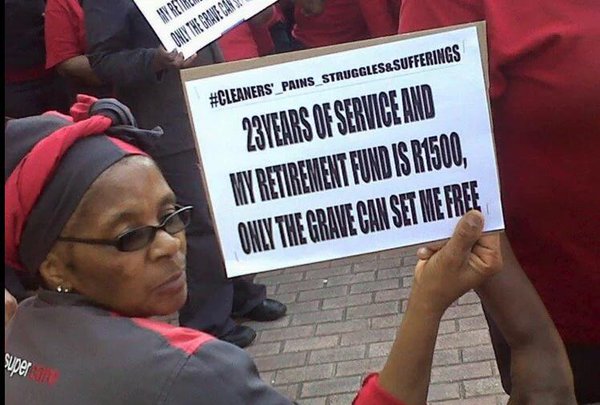 Workers protesting at #OccupyUJ Image source
Workers protesting at #OccupyUJ Image source
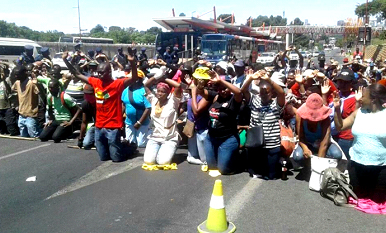 Protestors blocking the road in solidarity with #OccupyUJ. Shortly after 169 arrests were made, and protestors were taken to Brixton police station. Image source
Protestors blocking the road in solidarity with #OccupyUJ. Shortly after 169 arrests were made, and protestors were taken to Brixton police station. Image source
Sunday 8 November
UJ holds a night vigil to show solidarity with the struggle to end outsourcing.
Police disrupt and disperse the night vigil.
Monday 9 November
State decides to withdraw charges against remaining students and workers who were arrested, the #Brixton141
Friday 13 November
UJ nightvigil joined by Wits #FeesMustFall
What is described [18] as a peaceful protest attended by students and workers about Police Brutality, was disrupted by police.
UWC holds nightvigil about police brutality on the same night. Also attended by students from other institutions. Also described as a peaceful nightvigil, and disrupted by police brutality.
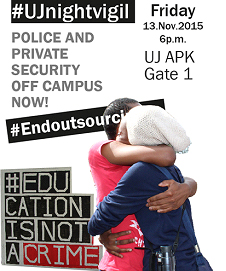 Posters for the #UJnightvigil Image source
Posters for the #UJnightvigil Image source
Saturday 14 November
Open discussion held about #FeesMustFall at Wits.
A draft set to be made by 19th of November for insourcing.
Sunday 15 November
Nompendulo Mkatshwa announced to appear on the cover of Destiny magazine.
This causes tensions amongst some students who argue FeesMustFall is a collective movement that should not be given a face, particularly Nompendulo who was not present in the protest for insourcing after the 0% fee increase was announced.
#WeAreNotUlo begins trending on Twitter.
 Nompendulo’s Destiny cover caused controversy in the FMF movement. Image source
Nompendulo’s Destiny cover caused controversy in the FMF movement. Image source
Thursday 18 November
Panel discussion on Living Wage, Minimum Wage, and Outsourcing held at Wits.
15 December
Update from SRC Treasurer Office: All students with R15000 outstanding fees or less will be allowed to graduate.
22 December
Wits SRC releases call [503] to students who have been academically excluded to appeal to the SRC for assistance.
3 January
Students who are part of the Wits FeesMustFall movement begin occupying Solomon House and taking up residency there.
4 January
Wits University officially opens for the year.
Wits SRC re-opens offices.
Wits SRC meets with the University at 11:30 am, and reaches several agreements outlined in a statement [501] released on Facebook, concerning:
Deferred and Supplementary Examinations
Academic Exclusion
Finance
SRC Humanitarian Fund
First Payment Plan
Accommodation
Residence Vacancies
When Residences Open
10 January
Wits SRC releases a call [502] to change the system of systematic exclusion on social media, this forms part of the SRC’s #AccessMustRise Campaign. The statement highlights:
“This struggle is about dignity!”
“The SRC has spent the last weeks of last year and the first of this year fully engaged in assisting our students. “
“Fundraising for students is not a solution to the problem. It is this problematic system that has necessitated the need to interrogate and challenge the system itself.”
“...we remain committed to serving students and to transforming our higher education spaces”
The statement goes on to say,
“We will be occupying Solomon House from Monday 11 January 2016 (the first day of registration) to start off the #FeesMustFall movement for 2016. All SRC activities will be moved to Solomon House... We will ensure that no academically qualifying student is turned away from registering based on their financial status!” [original statement does not highlight sentence]
11 January
First day of registration at Wits begins.
About 50 members of the Wits FeesMustFall student body occupy Solomon House.
SRC activities are moved to Solomon House to assist students.
Different factions within the WitsFeesMustFall movement, namely the SRC and members of the student body, are campaigning separately.
Members of the FMF student body are calling for a re-election of the SRC.
UJ occupation
Nzimande announces the government is to invest an additional 6.9 billion rand into higher education.
Police vehicles and private security present on campus
Wits Senior Executive Team release a statement [521] addressing the procedure to take for the registration disruptions, “Given the disruptions to the University’s registration processes today, Monday, 11 January, the Senior Executive Team has decided to postpone face-to-face registrations at Hall 29 for today (Monday, 11 January 2016) and tomorrow (Tuesday, 12 January 2016). We are urging all Health Sciences students for today and all Engineering and the Built Environment students for tomorrow to register online. You will be able to do so until Friday, 15 January 2015. All other students will also still be able to register online, as per the normal schedule.”
Student Demands as posted on the feesmustfall.joburg [522] website:
•We demand free education Now
•No registration fee (even where there is outstanding debt)
•By-elections for SRC (Elections were unconstitutional)
•Historic debt repayment for students who are graduating this year to scrapped in total.
•Access to academic record whether you are in debt or not.
•Left-over food from all dining halls must be given to poor students and day scholars on campus (inclusive of weekends)
•Suspensions and disciplinary action due to the protest that took place in 2015 should be revoked.
•No Police presence on campus
•African Students (International students) within the border of Africa should not pay an upfront fee payment of 75 percent but rather it should be pushed down to 50 percent.
•Removal of upfront accommodation fee and students should be allowed to move upon registration.
•Returning NSFAS Students in their final year should be given financial aid to complete their academic studies.
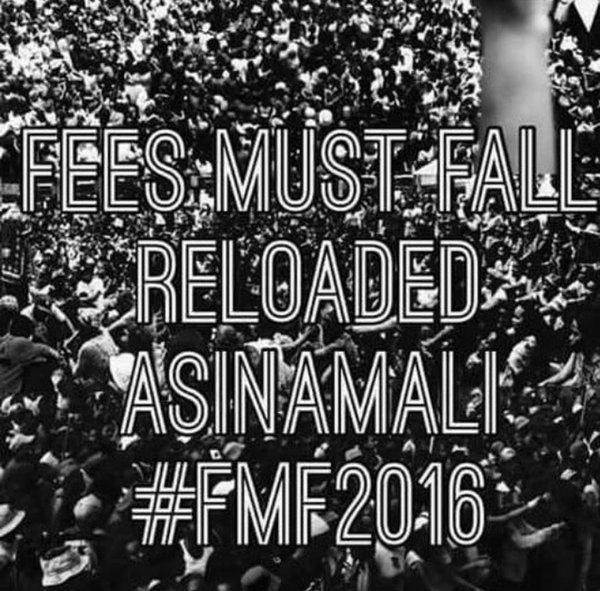 #FMF2016 poster. Slogan: Fees Must Fall Reloaded Asinamali. Image source
#FMF2016 poster. Slogan: Fees Must Fall Reloaded Asinamali. Image source
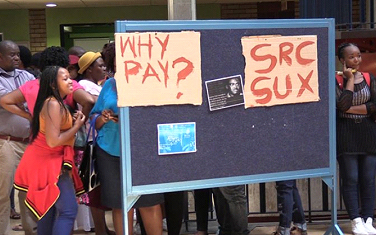 Fees Must Fall protests at registration 2016 were divided as many #FMF protesters disagree with SRC leadership. Image source
Fees Must Fall protests at registration 2016 were divided as many #FMF protesters disagree with SRC leadership. Image source
Highly informative article concerning FMF events. Consider including excerpts in timeline: [521a]
“The university is allowing students to sign up for a payment plan, which allows them to pay their registration by the end of March, but the SRC wants an assurance that even students who cannot pay by then are not excluded from their studies. The SRC also wants the university to create a road map towards achieving free education, and for agreements last year relating to workers and students to be honoured.”
Sarah Mokwebo, speaking for the Fees Must Fall collective, said the key demand is the scrapping of historical debt that prevents students from registering. The group's memorandum includes demands such as free education (now, it emphasises), the scrapping of the registration fee, fresh SRC by-elections, as the group says the last elections, where the Economic Freedom Fighters were barred from contending, were unconstitutional, and for no police to be present on campus. (On Monday a number of police vehicles were at Wits.)
Responding to the disruptions, Wits said face-to-face registrations would be delayed until Wednesday. It encouraged applicable students to register online and has set up a telephonic registration process for certain courses. Student leaders on Monday said they were yet to hold discussions with the university. A statement from Wits on Monday said: “We respect the right to protest and we support the call for free education for poor students. However, we cannot allow the financial sustainability of the university to be compromised. We urge all students to allow the registration process to continue undisrupted.”
It noted the presidency's announcement that the financial debt of students on the National Student Financial Aid Scheme (NSFAS) in 2015 will be settled by the state, but said other students must still pay their debts before registering. “We would have liked to make a concession in this regard, but the historical debt of these students amounts to over R100 million and if we were to make such a concession, the university would be thrown into a financial crisis that would compromise the education of all students,” said the university.
As the Fees Must Fall protests spread to most universities across the country last year, President Jacob Zuma announced fees would not increase at tertiary institutions in 2016 and engagements were held between students and the state. During the ANC's January 8 statement this weekend, Zuma highlighted the state's efforts on improving access to university studies and noted the influence of students.
On Sunday, Universities SA, representing the country's universities, called for increased state funding of the sector. On Monday, Higher Education and Training Minister Blade Nzimande said over 500,000 post-school education opportunities were available this year for learners across universities and technical and vocational education and training colleges. “We need to ensure, over the medium to long term, that sufficient financial aid is made available to support all academically deserving but financially needy university students though income contingent loans and bursaries, and at the same time to strive to keep university fees affordable,” said the Minister, who was criticised for his response to last year's protests.
Government has committed an additional R6.9 billion to fund the university system, said Nzimande, above the R10 billion already marked for the NSFAS. Of that increase, R2.3 billion is to cover the zero percent fee increase. The Minister emphasised NSFAS students do not need to pay upfront registration fees, but suggested a planned inquiry on the accessibility of tertiary education will look into the issue of students who don't qualify for NSFAS but who still can't afford their fees. After protests last year led to increased state efforts in improving access to tertiary institutions and agreements at campuses across the country attempting to address issues such as financial exclusion, the outsourcing of workers, and a lack of African content in the curriculum, at Wits students are keen to keep the momentum up. Both Mokwebo and Hassan said the plan is to continue protesting until their key demands are met.
S'bonakaliso Nene, a Wits student active in last year's protests, said, “The greater goal that we're pushing for is free education in South Africa now – not later, not soon, not in the future, not in our lifetime; Now! We need to start pushing for that. We need to see tangible, comprehensive steps taken by government, by all those in power, to show us the ways and means in which they are trying to attain this. We don't feel like a zero percent increase is good enough. That's merely just a start, because if you look at it those people who couldn’t afford fees, they still can't afford fees now.”
“Genuinely I feel like last year was a spark to the movement and how things are going with our generation,” he continued. “I think this year's going to be a whole lot more robust. I think there is going to be a lot more interaction in regards to issues that have been swept beneath the carpet, like race.” Nene predicted that as long as black people continue to be oppressed in South Africa and at institutions like Wits, future classes of students will continue the fight.
Some people who came to register on Monday, however, felt frustrated by the disruption. Busi Shongwe, who left Nelspruit in the early hours of the morning to register her 18-year-old daughter Charmane Mashabane to study occupation therapy, said she was sympathetic to the protesters. But the family felt confused as students were giving them different takes on what would happen and Shongwe had not heard anything from management. She said they cannot afford to stay in Johannesburg to wait until they can register.
“I'm afraid or sceptical that my child might not be registered. What will she do for the entire year because of the strike?” she asked, suggesting students were shutting the gate on new learners. Her daughter, Mashabane, said was excited to register when she arrived at Wits, but added, “I feel really sad now that I'm going back home and I can't do anything about it now, but I'm hoping they'll get back to me and respond because I'm hoping to study this year and not just sit at home.”
Asked about those who were disappointed on Monday, the SRC's Hassan said, “A revolution is going to be inconvenient. We know that it's not going to be smooth sailing for everyone, but I ask that those people bear with us because we're trying to change a system and we're trying to change the face of this country as the youth of South Africa post-1994 and it's going to be inconvenient and there are going to be times where everyone is frustrated with us but remember that we're doing it for the betterment of society, and the betterment of not just us but for future generations. Because if there's one thing we can give them it is free education to change their lives.”
Mokwebo, from Fees Must Fall, said she understands the inconvenience, but noted how she and other protesters are also inconvenienced, by the system and by making sacrifices for their aims. “I'd like to say we are all frustrated. I'm also frustrated as I speak to you right now.” She called on prospective students to find out about the movement and join in.
While the first day of protests at universities this year has already affected three institutions, it's unclear whether students will be able to achieve the mass momentum they built in 2015. At Wits, one challenge is the division among students. Solomon Mahlangu House, where the Fees Must Fall group were established, included the banners “SRC sux” and “Fuck ANC”.
Among that group were a number of EFF members. The SRC's Hassan, whose PYA is aligned to the ANC, suggested political opportunism was at play. “I think we must just be cognisant of the fact that a local government election is upcoming in the next few months and there are very opportunistic situations and parties and groups seeking to hijack things,” she said outside the building.
Mokwebo, speaking inside the building, said the SRC viewed the Fees Must Fall group as enemies when it continued protesting after Zuma's announcement following the march to the Union Buildings last year and the relationship is still strained. Both groups said they hope to find common ground going forward.”
Senior Executive Team statement [510] at 13:30: “Given the disruptions to the University’s registration processes today, Monday, 11 January, the Senior Executive Team has decided to postpone face-to-face registrations at Hall 29 for today (Monday, 11 January 2016) and tomorrow (Tuesday, 12 January 2016). We are urging all Health Sciences students for today and all Engineering and the Built Environment students for tomorrow to register online. You will be able to do so until Friday, 15 January 2015. All other students will also still be able to register online, as per the normal schedule.”
12 January
Members of the Wits FeesMustFall student body continue to occupy the Enrolment Centre in a demand for ‘free education now’. Registration is disrupted as members of the student body protest against exclusion through fees, such as the registration fees enlisting students are expected to pay.
Private security hired by Wits University evicts students who are disrupting registration from Solomon House ground floor. The number of students evicted by private security on this occasion range between 9 and 20.
Students were also occupying Solomon house as a residence, through necessity and in protest that no residency was provided for those writing deferred exams. While writing deferred exams, students needing to take up residency have been sleeping in libraries, lecture rooms, labs and on the floor of Solomon House.
14 January
President Jacob Zuma announces [520] a commission of inquiry into higher education funding and related issues. The inquiry will be chaired by a former judge of the Supreme Court of Appeal, Justice Jonathan Arthur Heher, who will be assisted by advocate Gregory Ally and attorney Leah Thabisile Khumalo. They will have eight months to complete their investigation and submit their findings to the president.
“14 January 2016 - On the 23rd of October 2015, President Jacob Zuma met with vicechancellors, chairpersons of university councils, presidents of student representative councils and the representatives of student organisations to discuss concerns with regard to fee increases and funding of higher education.
The President announced thereafter, that government would lead a process that will look at broader issues affecting the funding of higher education, cognisant of other endeavours in this regard.
The President has now appointed a Commission of Inquiry in terms of Section 84(2)(f) of the Constitution of the Republic of South Africa, 1996.”
SRCs from across the country arrive in Tembisa for a press briefing followed by a meeting with government, including Nzimande. The meeting was requested by the Department of Higher Education.
18 January
Wits SRC releases a statement [523] where they emphasize their involvement in the registration disruption as being instrumental to highlight the lack of access to higher education. The statement reaffirms the SRC’s dedication to financially excluded students, including the ‘missing middle’- the group of students who are too financially capable to qualify for NSFAS, but too poor to afford higher education.
The primary demands are listed as
•Debt clearance
•Free registration
•Free education
•Outstanding matters/ agreements of 2015
•Academic, enrolment and financial
•NSFAS and financial aid office
•Private security and police presence
•Accommodation and food matters
It is important to note that by this point the Wits SRC and the WitsFeesMustFall student body are releasing different statements.
The SRC’s #AccessMustRise campaign is a call for access to rise as fees fall.
19 January
The South African Council of Churches (SACC) meets with SRC representatives from tertiary institutions, including Wits and UJ, to discuss the current higher education standoff and proffer assistance to the student movements.
20 January
Blade Nzimande meets with vice chancellors from across the country to discuss the year ahead.
IMAGES:
26 January
FeesMustFall spreads to The University of Namibia (Unam) under the banner #VarsityLockdown and #UniversityLockdown. Student protests are organised by the Namibian National Students Organization, which is demanding the scrapping off of registration fees.
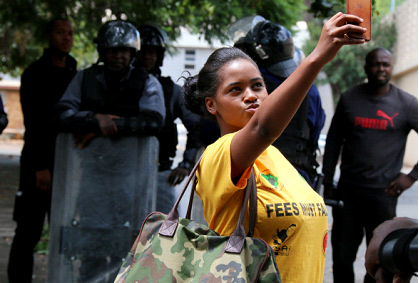 Students are utilising social media to protest the presence of heavy policing forces on campus. Credit: Michelle Gumede Image source
Students are utilising social media to protest the presence of heavy policing forces on campus. Credit: Michelle Gumede Image source
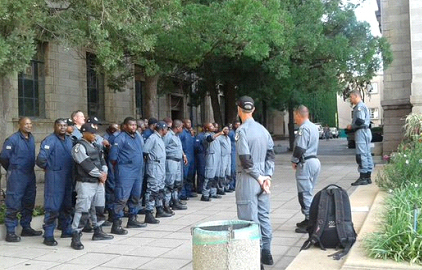 Credit: Simamkele Dlakavu Image source
Credit: Simamkele Dlakavu Image source
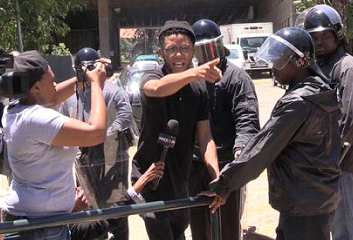 Credit: Vumani Mkhize/EWN Image source
Credit: Vumani Mkhize/EWN Image source
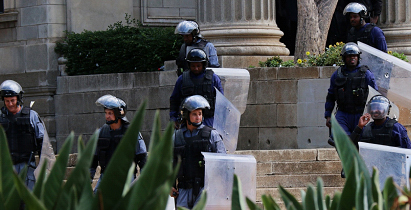 Private security in full riot gear. Credit: Michelle Gumede Image source
Private security in full riot gear. Credit: Michelle Gumede Image source
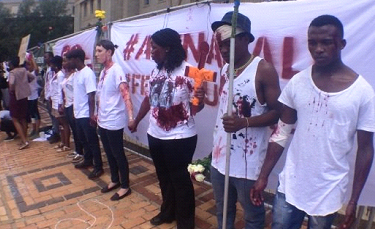 Students theatrically protest against the violence of private security towards students and staff on campus. Image source
Students theatrically protest against the violence of private security towards students and staff on campus. Image source
Endnotes
[101] www.facebook.com/Witssrc201213/posts/494696367345493 ↵
[102] https://www.facebook.com/Witssrc201213/posts/544198149061981↵
[103] http://witsworkerssolidaritycommittee.blogspot.co.za/2015_10_01_archive.html↵
[1] https://www.facebook.com/Witssrc201213/posts/545742872240842↵
[2] http://www.wits.ac.za/newsroom/newsitems/201510/27453/news_item_27453.html↵
[4.1] http://witsvuvuzela.com/2015/10/16/student-protest-not-deterred-by-pepper-spray/↵
[5] http://www.news24.com/SouthAfrica/News/Wits-suspends-fee-hike-20151017-2↵
[6] http://www.wits.ac.za/newsroom/newsitems/201510/27508/news_item_27508.html↵
[7] http://www.wits.ac.za/newsroom/newsitems/201510/27515/news_item_27515.html↵
[8] http://www.iol.co.za/news/politics/students-deliver-memorandum-to-anc-1.1934314#.VlRh4tIzfs0↵
[42] http://www.thepresidency.gov.za/pebble.asp?relid=20860↵
[41] http://www.wits.ac.za/newsitems/201510/27531/news_item_27531.html↵
[10] http://www.wits.ac.za/studentservices/studentrepresentativecouncil/27541/wits_src_statement.html↵
[11] http://www.wits.ac.za/newsroom/newsitems/201510/27537/news_item_27537.html↵
[13] http://www.wits.ac.za/newsroom/newsitems/201509/27585/news_item_27585.html↵
[501] https://www.facebook.com/Witssrc201213/posts/576238689191260↵
[502] https://www.facebook.com/Witssrc201213/posts/578394962308966↵
[503] https://www.facebook.com/Witssrc201213/photos/a.160055110809622.37988.156779874470479/570659219749207/?type=3↵
[521] https://www.wits.ac.za/news/latest-news/general-news/2016/feesmustfall2016/statements/registration-update-for-studentsguardians.html↵
[522] http://www.feesmustfall.joburg/2016/01/11/students-demands-2/↵
[510] https://www.wits.ac.za/news/latest-news/general-news/2016/feesmustfall2016/statements/registration-update-for-studentsguardians.htm↵
[520] http://www.dhet.gov.za/SiteAssets/Latest%20News/January%202016/PRESIDENT%20ZUMA%20ANNOUNCES%20COMMISSION%20OF%20.pdf↵
[521a] Excerpts from Daily Maverick, available at http://www.feesmustfall.joburg/2016/01/11/students-demands-2/↵
[523] https://www.facebook.com/Witssrc201213/posts/581459188669210↵


